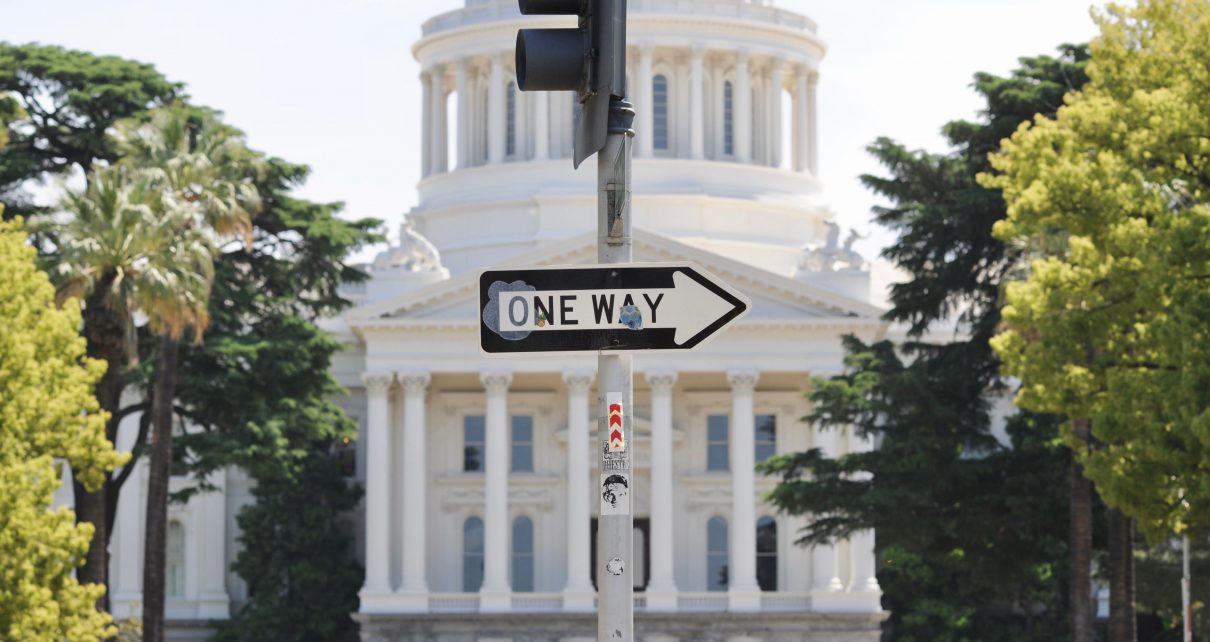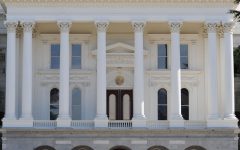
California State Capitol - One Way. (Photo: Kevin Sanders for California Globe)
Political Affiliations under the California Labor Code
Requires the office of the Attorney General to maintain a whistleblower hotline
By Chris Micheli, May 10, 2023 2:30 am
California Labor Code Division 2, Part 3, Chapter 5 regulates political affiliations. Chapter 5 was added in 1937 by Chapter 90. Labor Code Section 1101 prohibits employers from making, adopting, or enforcing any rule, regulation, or policy (a) Forbidding or preventing employees from engaging or participating in politics or from becoming candidates for public office; or (b) Controlling or directing, or tending to control or direct the political activities or affiliations of employees.
Section 1102 prohibits employers from coercing or influencing or attempting to coerce or influence his employees through or by means of threat of discharge or loss of employment to adopt or follow or refrain from adopting or following any particular course or line of political action or political activity.
Section 1102.5 prohibits an employer, or any person acting on behalf of the employer, from making, adopting, or enforcing any rule, regulation, or policy preventing an employee from disclosing information to a government or law enforcement agency, to a person with authority over the employee, or to another employee who has authority to investigate, discover, or correct the violation or noncompliance, or from providing information to, or testifying before, any public body conducting an investigation, hearing, or inquiry, if the employee has reasonable cause to believe that the information discloses a violation of state or federal statute, or a violation of or noncompliance with a local, state, or federal rule or regulation, regardless of whether disclosing the information is part of the employee’s job duties.
Section 1102.6 provides that, in a civil action or administrative proceeding, once it has been demonstrated by a preponderance of the evidence that an activity proscribed was a contributing factor in the alleged prohibited action against the employee, the employer has the burden of proof to demonstrate by clear and convincing evidence that the alleged action would have occurred for legitimate, independent reasons even if the employee had not engaged in activities protected.
Section 1102.61 states that, in any civil action or administrative proceeding, an employee may petition the superior court in any county wherein the violation in question is alleged to have occurred, or wherein the person resides or transacts business, for appropriate temporary or preliminary injunctive relief.
Section 1102.62 provides that, upon the filing of the petition for injunctive relief, the petitioner must give notice that is served upon the person, and thereupon the court has jurisdiction to grant such temporary injunctive relief as the court deems just and proper.
Section 1102.7 requires the office of the Attorney General to maintain a whistleblower hotline to receive calls from persons who have information regarding possible violations of state or federal statutes, rules, or regulations, or violations of fiduciary responsibility by a corporation or limited liability company to its shareholders, investors, or employees.
Section 1102.8 requires an employer to prominently display in lettering larger than size 14 point type a list of employees’ rights and responsibilities under the whistleblower laws, including the telephone number of the whistleblower hotline.
Section 1103 specifies that an employer or any other person or entity that violates this chapter is guilty of a misdemeanor punishable, in the case of an individual, by imprisonment in the county jail not to exceed one year or a fine not to exceed $1,000 or both that fine and imprisonment, or, in the case of a corporation, by a fine not to exceed $5,000.
Section 1104 makes employers responsible for the acts of their managers, officers, agents, and employees in all prosecutions. Section 1105 precludes anything in this area of law from preventing the injured employee from recovering damages from his employer for injury suffered through a violation of this chapter. Section 1106 defines the term “employee.”
- Vessel Repair in California - August 23, 2025
- Board of Pilot Commissioners - August 22, 2025
- Rights and Duties of Witnesses in Civil Actions - August 21, 2025







One thought on “Political Affiliations under the California Labor Code”